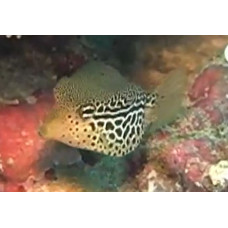Latin name
Ostracion solorensis
Other name
Ostracion solorensis
Identification
This species is a relatively rare inhabitant of coral-rich areas of coastal reefs. The striped boxfish has a characteristic bony protrusion above the upper lip.
Features of fish fins
Dorsal spines (total): 0; Dorsal soft rays (total): 9; Anal spines: 0; Anal soft rays: 9.
Fish colouring
Males are bluish gray to blackish with thin pale blue and wavy lines on the back, a broad dark band with light wavy lines along the upper flank, and white spots with a black border on the sides.
Females have thin black lines on the back, the sides are yellowish brown to greenish brown with broad black bars.
Distribution
Western Pacific: Christmas Island in the eastern Indian Ocean and from Indonesia to Fiji, north to the Philippines. Recently recorded from Tonga and the northern Great Barrier Reef.
Habitat
Marine tropical reef associated species. Depth range from 1 to 20 meters.
Size
The maximum length of the reticulated boxfish is 12 cm.
Behavior
Occupies clear coastal reefs in invertebrate-rich habitats on shallow ridges or in the upper zone of slopes, singly or in pairs.
Food and feeding habits
Ostracion solorensis feed mainly on invertebrates.
Reproduction
Sexual dimorphism is present. There is little studied information on the reproduction of this species. These fish do not reproduce in captivity.
Fishing
Have no commercial importance. Of no interest to fishermen.
Relationship with a person
Venomous. Sometimes these fish are kept as aquarium fish.
| Classification | |
| Phylum | Chordata |
| Class | Actinopterygii |
| Squad | Tetraodontiformes |
| Family | Ostraciidae |
| Genus | Ostracion |
| Species | O. solorensis |
| Features | |
| Conservation status | Not Evaluated |
| Habitat | Pelagic |
| Life span, years | No information |
| Maximum body weight, kg | No information |
| Maximum length, cm | 12 |
| Sailing speed, m/s | No information |
| Threat to people | Not edible |
| Way of eating | Planktonophage |
Reticulate boxfish
Tags: reticulate boxfish



